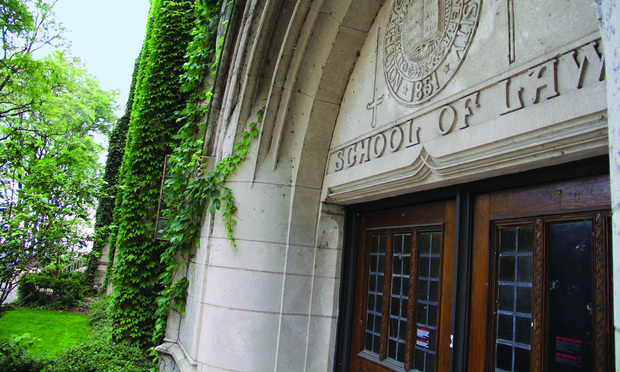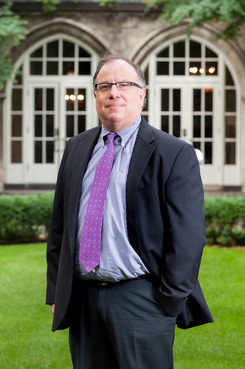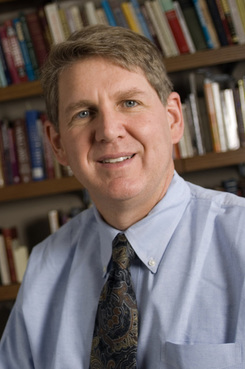Should Top Law Schools Care About Innovation?
Northwestern Law School's foray into training students for legal operations roles has its dean facing existential questions about legal market change.
May 02, 2018 at 04:21 PM
7 minute read
The original version of this story was published on The American Lawyer

If there is a crisis in legal education, it is not happening at Northwestern Pritzker School of Law.
Statistics released this month from the American Bar Association show 82 percent of the school's 2017 graduates were fully employed in positions requiring a law degree, which compares favorably to 66 percent of graduates across the country. Northwestern sent 137 graduates, 55 percent of the class, into Big Law, where they will begin paying down law school debt with the help of $180,000 annual salaries.
Yet even as the gilded age still is paying off for many at Northwestern, the prestigious school on Chicago's lakefront is making plays into the growing, and as-yet-often-confounding, business of changing the legal market.
Northwestern has made significant investments in faculty and curriculum changes that amount to a bet that the market for its students will not always rely on the prestige that comes with being a top-10 law school. In short, it is a bet that the market for talent will be redefined by the emergence of technology and that the Big Law partnership track will not be the only prestigious, high-paying landing spot for the nation's most lauded law grads.

Under the leadership of Dean Daniel Rodriguez, who will step down at the end of the year, Northwestern has launched an incubator for legal education innovation; invested in well-known professors in the innovation space; partnered with a program to send students into nontraditional jobs in corporate legal departments; and aligned itself with New Law company executives. This week, the law school will host a “global legal innovation summit” with presentations from executives at Elevate Services Inc., Diligen, ROSS Intelligence Inc. and others.
In an “innovation index” of law schools compiled by Michigan State University's Daniel Linna (who will be a visiting professor at Northwestern this year), Northwestern ranked among the top schools alongside Michigan State, Chicago-Kent College of Law, Stanford University, Suffolk University, the University of Miami and Vermont Law School.
In aligning itself with a view of an emerging, technology-centric legal market, Northwestern finds itself facing questions similar to those in the vanguard of other areas of the legal economy: Just how fast will the future get here? Is enough change happening to create demand for a supply of its product (law students with new skills and interests)? And, either way, should a prestigious institution cater to an uncertain new market when the current well-heeled market still pays top dollar to more than half of its students?
Rodriguez said it is too soon to answer some of those questions. He said he is skeptical that Northwestern grads would have a large interest in, for example, legal operations jobs, noting that they pay around $70,000 to $80,000 a year, when students could make more than twice that in Big Law. But he said the “core insight” that drives his interest in teaching emerging skills to law students is not necessarily immediate job prospects.
“The best we can do for our students in preparing and mentoring them is to give them the skills they could use soon after graduation and into their early careers to be able to work in a multi-disciplinary way at the interface of law, business and technology,” Rodriguez said in an interview. “That's where the future [lies].”
In perhaps the biggest challenge to the traditional legal education model, Northwestern earlier this year signed up as one of four initial schools to take part in the Institute for the Future of Law Practice (IFLP).
By pairing law students with internships at corporate legal departments, IFLP is an effort to fund and coordinate the training and hiring of lawyers with new skills. As an independent organization, IFLP is also attempting to scale a program developed at the University of Colorado Law School known as the Tech Lawyer Accelerator (TLA). Colorado, the University of Indiana and Osgoode Hall Law School in Toronto are the three other founding schools involved in IFLP.
The program has two components: A 10-week internship at a company for 1Ls ($20 an hour), and a seven-month job placement for 2Ls (minimum $5,000 per month salary). Each intern takes part in a legal-business-tech “boot camp,” which is three weeks for the 1Ls and five weeks for the 2Ls.
Under the IFLP model, these boot camps will be worth three hours of credit for some schools and will take place for the first time this summer at Northwestern. The ultimate goal is to create an alternative to summer hiring at Big Law firms. That will require more companies and more law firms valuing the types of skills that the boot camps impart on students.

“I really feel like we're working on behalf of the legal industry and we're filling a gap that will allow law schools and legal employers to come together where the legal profession modernizes and turns the corner,” said William Henderson, a leader of IFLP and a visiting professor at Northwestern. “This idea that lawyers and law firms and legal education never changes is not really true. But it's hard to build something that's sustainable and can rival the Socratic Method, [on-campus interviews] and Big Law jobs.”
Tim Mohan, the managing partner of Chapman and Cutler, which sponsors IFLP and has been collaborating with Henderson to hire pre-law school interns for the past few years, said he was impressed by Rodriguez's commitment to a vision of a changing legal marketplace.
“It's impressive to me that a law school that is that prestigious is willing to look at itself that way,” Mohan said. “I think that takes a lot of courage and I've been very impressed.”
Amy Bauer, a professor at Colorado Law School who has led the TLA, said IFLP envisions providing a certification to say a student has acquired a set of skills that would make them a good fit for a legal operations or legal technology role. But she said the slow pace of change in the legal market means it will take time before that certificate has a reliable value in a job search.
“It will take years probably for a company to say we'll hire you out of law school provided you have this certification,” Bauer said. “That's the dream.”
In the meantime, Northwestern's Rodriguez said he was surprised at the amount of interest that Northwestern students showed in the IFLP boot camps. But, down the line, he said those students will likely be asking a host of questions about job opportunities arising out of IFLP. For instance, will an internship at a company like Cisco Systems Inc. (the company that spearheaded Colorado's TLA) lead to a career path that could one day end in a general counsel position? If Cisco doesn't hire the student, will another company see the value in the skills they've acquired?
“Most companies are like law firms: highly prestigious, hidebound and the old way is the best way,” Rodriguez said. “The question will be, will these turn into jobs?”
Ultimately, Rodriguez said Northwestern would remain committed to IFLP as long as there is student demand for it.
He thinks there will be, some indication of which he's had by the growing number of students who ask him or the school's career services about how to get jobs at legal tech companies. And he said other prestigious schools have focused on the intersection of technology and the law, such as Harvard Law School's Access to Justice Lab.
“It's too soon to tell whether these types of partnerships between this new institute and law schools will really gain traction,” Rodriguez said. “I'm not going to sugarcoat it and say Northwestern is in this, come hell or high water. There are some really tricky issues involving the model of the program that only time will tell whether they can be sorted out.”
This content has been archived. It is available through our partners, LexisNexis® and Bloomberg Law.
To view this content, please continue to their sites.
Not a Lexis Subscriber?
Subscribe Now
Not a Bloomberg Law Subscriber?
Subscribe Now
NOT FOR REPRINT
© 2025 ALM Global, LLC, All Rights Reserved. Request academic re-use from www.copyright.com. All other uses, submit a request to [email protected]. For more information visit Asset & Logo Licensing.
You Might Like
View AllTrending Stories
- 1California’s New Deepfake Laws: Banning the Deception
- 2MoFo Doubles Down on Private Equity in Asia
- 3The Value of ComFed for New Lawyers (And Not So New Ones)
- 4The 'Nonprofit Killer Bill': Separating Fear From Fact on HR 9495
- 5As U.S. Firms Gain Market Share, Freshfields Maintains Top Spot in European M&A Rankings
Who Got The Work
Michael G. Bongiorno, Andrew Scott Dulberg and Elizabeth E. Driscoll from Wilmer Cutler Pickering Hale and Dorr have stepped in to represent Symbotic Inc., an A.I.-enabled technology platform that focuses on increasing supply chain efficiency, and other defendants in a pending shareholder derivative lawsuit. The case, filed Oct. 2 in Massachusetts District Court by the Brown Law Firm on behalf of Stephen Austen, accuses certain officers and directors of misleading investors in regard to Symbotic's potential for margin growth by failing to disclose that the company was not equipped to timely deploy its systems or manage expenses through project delays. The case, assigned to U.S. District Judge Nathaniel M. Gorton, is 1:24-cv-12522, Austen v. Cohen et al.
Who Got The Work
Edmund Polubinski and Marie Killmond of Davis Polk & Wardwell have entered appearances for data platform software development company MongoDB and other defendants in a pending shareholder derivative lawsuit. The action, filed Oct. 7 in New York Southern District Court by the Brown Law Firm, accuses the company's directors and/or officers of falsely expressing confidence in the company’s restructuring of its sales incentive plan and downplaying the severity of decreases in its upfront commitments. The case is 1:24-cv-07594, Roy v. Ittycheria et al.
Who Got The Work
Amy O. Bruchs and Kurt F. Ellison of Michael Best & Friedrich have entered appearances for Epic Systems Corp. in a pending employment discrimination lawsuit. The suit was filed Sept. 7 in Wisconsin Western District Court by Levine Eisberner LLC and Siri & Glimstad on behalf of a project manager who claims that he was wrongfully terminated after applying for a religious exemption to the defendant's COVID-19 vaccine mandate. The case, assigned to U.S. Magistrate Judge Anita Marie Boor, is 3:24-cv-00630, Secker, Nathan v. Epic Systems Corporation.
Who Got The Work
David X. Sullivan, Thomas J. Finn and Gregory A. Hall from McCarter & English have entered appearances for Sunrun Installation Services in a pending civil rights lawsuit. The complaint was filed Sept. 4 in Connecticut District Court by attorney Robert M. Berke on behalf of former employee George Edward Steins, who was arrested and charged with employing an unregistered home improvement salesperson. The complaint alleges that had Sunrun informed the Connecticut Department of Consumer Protection that the plaintiff's employment had ended in 2017 and that he no longer held Sunrun's home improvement contractor license, he would not have been hit with charges, which were dismissed in May 2024. The case, assigned to U.S. District Judge Jeffrey A. Meyer, is 3:24-cv-01423, Steins v. Sunrun, Inc. et al.
Who Got The Work
Greenberg Traurig shareholder Joshua L. Raskin has entered an appearance for boohoo.com UK Ltd. in a pending patent infringement lawsuit. The suit, filed Sept. 3 in Texas Eastern District Court by Rozier Hardt McDonough on behalf of Alto Dynamics, asserts five patents related to an online shopping platform. The case, assigned to U.S. District Judge Rodney Gilstrap, is 2:24-cv-00719, Alto Dynamics, LLC v. boohoo.com UK Limited.
Featured Firms
Law Offices of Gary Martin Hays & Associates, P.C.
(470) 294-1674
Law Offices of Mark E. Salomone
(857) 444-6468
Smith & Hassler
(713) 739-1250






